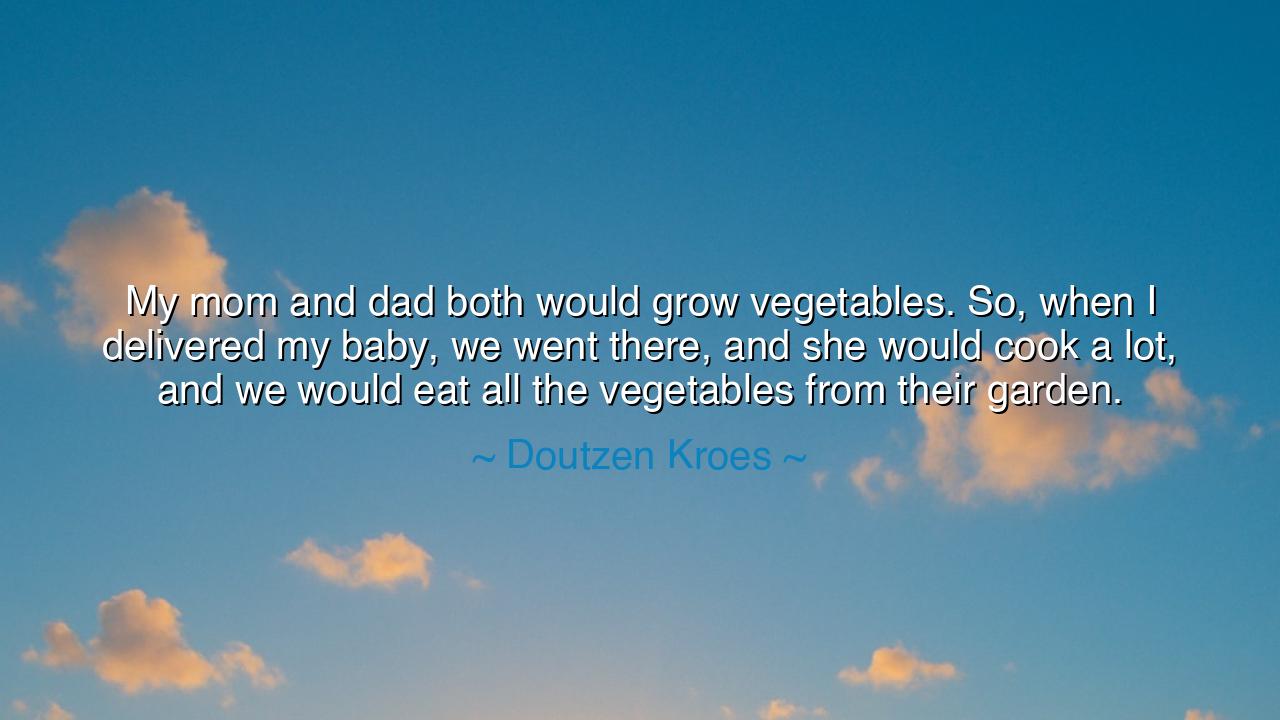
My mom and dad both would grow vegetables. So, when I delivered
My mom and dad both would grow vegetables. So, when I delivered my baby, we went there, and she would cook a lot, and we would eat all the vegetables from their garden.






"My mom and dad both would grow vegetables. So, when I delivered my baby, we went there, and she would cook a lot, and we would eat all the vegetables from their garden." — Doutzen Kroes
In these gentle, heartfelt words, Doutzen Kroes, the Dutch model and humanitarian, speaks not only of her parents’ garden but of the deep and sacred roots of family, nourishment, and love. The simplicity of her story hides a timeless wisdom—the understanding that what we grow with our hands feeds not only the body but also the soul. When she says, “My mom and dad both would grow vegetables,” she is not merely recalling a memory of soil and harvest; she is honoring the continuity of care, the cycle of giving and receiving that binds generations together. The garden, in her words, becomes a symbol of life itself—of how love, when cultivated patiently, yields sustenance for those who come after us.
The origin of this quote lies in Doutzen’s upbringing in the Netherlands, where her family lived close to nature and valued simplicity over luxury. Her parents were not figures of fame but of quiet diligence, growing their own food, living by the rhythm of the earth. And when their daughter returned home after giving birth—a moment when a new life enters the world and another life is transformed—her parents did what they had always done: they nourished. Her mother cooked from the garden’s bounty, offering not just meals but comfort, connection, and love that was tangible and pure. In that act, the eternal cycle of parent and child, giver and receiver, was renewed once more.
This small story reveals a great truth: that greatness is born not only in palaces but in gardens, not in grandeur but in gratitude. To grow food is to take part in the oldest ritual of humanity—the covenant between earth and life. The ancients understood this deeply. The philosopher Diogenes, who lived simply among his few possessions, taught that self-sufficiency and virtue walk hand in hand. He would have seen Kroes’s parents’ garden as a sacred act of harmony with nature. Likewise, in the temples of ancient Egypt, the priests tended gardens not only for food but as offerings to the gods, understanding that to nurture life is the highest form of worship.
When Kroes speaks of returning to her parents’ home after giving birth, she evokes something elemental and eternal: the return to the source. After the pain and wonder of bringing new life into the world, she sought the place where life had first been given to her. There, among the familiar soil and the scent of fresh vegetables, she found strength again. The garden becomes a metaphor for the enduring wisdom of the elders—the parents who, through their labor, provide roots for their children to draw from. The vegetables are not just food; they are memory, tradition, and the tangible fruits of care.
Such a vision reminds us of the value of simplicity in a world obsessed with excess. The modern mind seeks satisfaction in abundance, yet forgets that the most profound joys come from what is humble and honest. A meal cooked from one’s own garden holds more beauty than a feast prepared by strangers, for it carries the essence of love and effort. Each seed planted by Kroes’s parents, each vegetable harvested, was an act of quiet devotion—a declaration that real wealth lies not in possessions but in sustainability, family, and shared nourishment.
Consider the story of Cincinnatus, the Roman statesman who, when his nation called upon him to lead, left his plow and field to serve. When the crisis was over, he refused power and returned again to his farm. His greatness was not in his rule but in his humility—in knowing that tending the earth was as noble as leading an army. So too do Kroes’s words remind us that the work of the hands and the love of the home are the true foundations of civilization. The garden is not small—it is the beginning of everything.
So, my child of the future, take this teaching into your heart: cherish your roots, and honor the soil from which you came. In the world’s rush and noise, do not forget the simple acts that sustain life—planting, cooking, sharing, loving. If you have parents or elders who have tilled the earth or labored for your well-being, give them your gratitude. If you have the chance, plant something of your own, and nurture it as they nurtured you. For as Doutzen Kroes shows through her gentle remembrance, it is in the humble garden of family love that we find the deepest wisdom—the understanding that what is grown with care will one day feed the generations yet to come.






AAdministratorAdministrator
Welcome, honored guests. Please leave a comment, we will respond soon